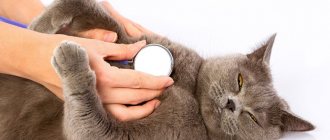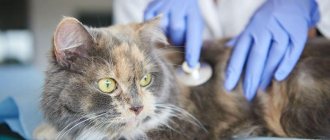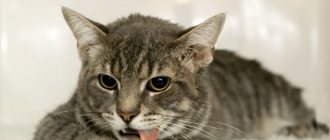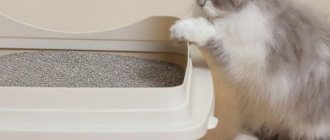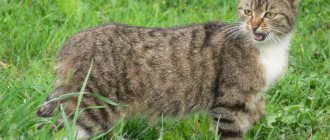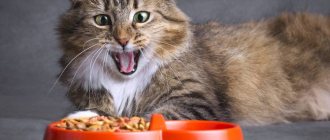A cat breathes heavily from its belly - when is it normal?
If the lack of oxygen is temporary, then there is no need to worry. The respiratory rate subsides and the cat breathes through its nose again.
The phenomenon develops due to the following reasons:
- heat;
- estrus;
- lambing;
- lactation;
- excessive physical activity;
- fright;
- motion sickness in a car.
Heart pathologies
The heart, this “fiery engine,” becomes very vulnerable in old age. Dystrophic changes, stress and toxins - all this can lead to unpleasant consequences. You should be wary and show your pet to a veterinarian in the following cases:
- The cat becomes very (too) apathetic and tries not to walk or jump unnecessarily.
- Even after very minor physical exertion, the animal experiences severe shortness of breath , the cat breathes heavily and very hoarsely.
- In advanced cases, swelling is observed, localized in the extremities, abdomen and chest.
Dangerous symptoms if a cat breathes with its belly
Abdominal breathing occurs in the following diseases or physiological conditions:
- Entry of a foreign object into the respiratory tract. It could be a pebble, a twig or a bone. If an object gets into the nasal passages, the cat sneezes. If it gets into the throat, profuse salivation develops.
- Infectious diseases: rhinotracheitis or calcivirosis. Additional symptoms are greenish-yellow discharge from the nose or eye, ulcers on the tongue, stomatitis, diarrhea, poor appetite, depression.
- Rhinitis, bronchitis, pneumonia arising for reasons not related to infectious diseases. Additional symptoms are mucous or purulent discharge from the nose, cough, fever.
- Damage to the lungs by nematode larvae. Additional signs: dry cough, refusal to eat, lethargy, severe shortness of breath with minimal exertion .
- Pulmonary edema: a symptom that develops with the following diseases: allergies, pathologies of the liver, heart, kidneys, trauma. Fluid accumulates in the chest cavity, which interferes with gas exchange. The cat convulsively swallows air, does not eat anything, does not respond to the call. Gums are pale or bluish.
- Dental diseases, gingivitis, stomatitis. Heavy breathing is accompanied by a refusal to feed and a foul odor from the mouth.
- Heart failure and cardiovascular pathologies are characterized by shortness of breath, blue mucous membranes, and foamy discharge from the burrow and mouth.
Be sure to read:
The cat drinks a lot of water: reasons, what to do if the animal is losing weight, how to help
If this isn’t enough for you, here are a few more likely causes of an animal’s heavy breathing:
- Head injuries or rib fractures. Swelling occurs and the blood supply to the respiratory center is disrupted. Pain in the ribs prevents the muscles responsible for breathing in and out from contracting.
- The allergy is characterized by swelling of the nasal mucosa and blockage of the respiratory canal. If spasms occur in the throat and trachea area, the cat is at risk of death from suffocation.
- Poisoning is accompanied by profuse salivation, diarrhea, vomiting, and muscle tremors.
- Anemia - develops as a result of blood loss, helminthic infestation, unbalanced nutrition, diseases of the blood system. When there is a deficiency of hemoglobin, the body tries to increase the availability of oxygen by increasing the frequency of inhalations and exhalations.
- Obesity—the lungs do not have time to provide oxygen to all the tissues of the disproportionately overgrown body. The second reason is compression of the lungs by internal organs.
- Tumors: An additional symptom is bleeding from the nostrils.
The cat breathes with its mouth open
Unlike dogs, in which rapid breathing with a protruding tongue is normally used to increase the area of moisture evaporation and regulate body temperature (after active physical activity or in hot weather), cats do not have such a cooling mechanism. If a cat is breathing with its mouth open, this indicates a serious condition, often requiring emergency veterinary attention.
Content
- Causes of difficulty breathing in cats
- Shock as one of the reasons for breathing with an open mouth
- Entry of foreign objects into the respiratory tract
- Heart problems
Causes of difficulty breathing in cats
Most often, this symptom is associated with severe oxygen starvation - hypoxia, when for various reasons oxygen from the inhaled air is not delivered in sufficient quantities to the organs and tissues of the body.
If, along with such breathing, the cat’s abdominal muscles actively move (as if she is trying to inhale air with her stomach and push it out as she exhales), this is called abdominal breathing and indicates that the lungs and pectoral muscles cannot cope with the respiratory function. Normally, there should be a vacuum in the chest cavity around the lungs, which allows the lungs to fully expand when inhaling. Due to injuries and a number of other pathologies, air can enter the chest cavity (this condition is called pneumothorax) or various types of body fluids (hydrothorax): blood, inflammatory or non-inflammatory effusion. Because of this, the lungs cannot expand normally and take in enough air for breathing; the cat tries to breathe through the mouth.
An animal can only be helped in a veterinary clinic, and you need to go there urgently. First of all, the doctor will pump out the contents of the chest cavity and determine its nature, and the animal will be placed in an oxygen box for several hours. Further treatment (and, if necessary, more detailed diagnosis) will depend on what exactly filled the chest cavity and what pathological causes could cause this condition. Your veterinarian will tell you about this after providing first aid to your pet. But in any case, the cat will be indicated for treatment in a hospital for at least one day (and possibly several) in order to minimize the risk of recurrence of the pathological condition.
Shock as one of the reasons for breathing with an open mouth
Another reason explaining why a cat breathes with its mouth open may be the development of shock - a severe circulatory disorder, again leading to oxygen starvation of tissues, because the blood does not reach them for various reasons. Shock can develop as a result of injury, an allergic reaction, or intoxication (both from exposure to toxic substances and from the development of an infectious process in the animal’s body). But whatever the reason, urgent help from a veterinarian is needed, and if the cat is in shock, she will need treatment in an intensive care unit, where she will spend several days under IVs and constant medical supervision.
Entry of foreign objects into the respiratory tract
If breathing with an open mouth appears suddenly while feeding or playing with any small objects, if the cat tries to clear its throat or you hear wheezing or whistling, you should also immediately contact a veterinary clinic, because the cat may have choked on particles of food or toys, and it is usually impossible to remove them from the respiratory tract on its own.
Heart problems
Owners often notice that a cat is breathing heavily through its mouth after active play or running. In this case, the animal's tongue may acquire a bluish tint. Having rested a little, the pet behaves as usual again, but this state cannot be attributed simply to fatigue. It most likely indicates the development of heart failure, and such an animal needs to be examined by a cardiologist to identify the pathology at an early stage.
Thus, breathing with an open mouth in cats is an alarming symptom of many serious pathologies that require emergency assistance from veterinary specialists, and you will provide great help to your pet by paying attention to this in time and immediately contacting a veterinary clinic.
The article was prepared by doctors of the therapeutic department "MEDVET" © 2014 SEC "MEDVET"
The cat is breathing heavily: how to provide first aid?
The animal should be observed. If abdominal breathing is associated with physiological reasons, it will pass within half an hour. You need to come to terms with abdominal breathing associated with pregnancy or lactation; this is a normal phenomenon. If your pet gets sick in a car, you need to stop and wait until the animal comes to its senses.
Special remedies have been developed against motion sickness. Veterinarians recommend giving 1 ml of Vetspokoin suspension or a drop of Stop-Stress per 1 kg of weight a couple of hours before the trip.
If heavy breathing is caused by hot weather, then the pet is moved to a cool place or the air conditioner is turned on, but so that the cold air does not fall on the cat. Otherwise, shortness of breath will occur due to bronchitis or rhinitis.
In all other cases, the animal must be shown to a veterinarian. Above we have given a fairly comprehensive list of problems, most of which only a doctor can identify and help the animal.
Be sure to read:
Why does a cat have blood from under its tail: is it flowing or dripping, what should the owner do, should he worry?
Cases when only a specialist can handle it
Mouth breathing can be a symptom of a dangerous disease. Let's look at the most common causes of the disease:
- Allergy. It can be caused by anything: food, toilet litter, shampoo, an insect bite. To identify allergies, you need to consult a veterinarian. Try to compare all the facts: what could your pet’s body react to like that? What new things did you buy for the cat? Has he been outdoors lately? Also pay attention to rashes, itching and sneezing. These are all clear symptoms of allergies. This data will help the veterinarian identify the allergen.
- Injuries. They can cause the animal very severe pain. Because of this, breathing may become faster. If your pet has been injured or hit, pay attention to his breathing. If it is not stable, it means the animal is in pain. In this case, the cat needs to be shown to the veterinarian again. Your pet may need re-examination and may have injuries that are not obvious.
- Pulmonary pathologies.
- Pathologies of the nose. These include airway spasms and nasal blockage.
- Foreign objects in the throat. You will immediately recognize this reason. The cat will characteristically clear its throat, wheeze and try to reach the object.
- Endocrine diseases.
- Fever and temperature.
- Accumulation of air in the sternum.
- Heart failure.
All these problems can only be identified and treated by a specialist. Do not self-medicate. But you can still provide first aid to your pet.
How else can you make your cat's breathing easier?
To make it easier for your pet to breathe, you should not smoke or use cosmetics in his presence. The room should be regularly ventilated, but drafts should not be allowed. Sometimes examining the mouth helps. There may be a fish bone or foreign object stuck in it. In some cases, turning the pet over and applying light pressure on the chest helps.
If abdominal breathing does not disappear for more than half an hour, and the pet’s health condition rapidly deteriorates, you should immediately take it to the clinic. In such a situation, every minute counts. When the cat is breathing with an open mouth and heaving sides, but the state of health remains satisfactory, the visit to the hospital can be rescheduled for the next day.
Reasons for changes in respiratory rate in cats
1. Physiological reasons - a natural reaction of the body, which is the norm. It can be caused by:
- physical activity. In healthy animals, respiratory rate depends mainly on the level of physical activity. The calmest breathing in cats is during sleep;
- stress. When nervous, angry, or excited, the cat's breathing quickens. For example, while traveling in a car, when moving to a new place, during various medical procedures. This is a short-term phenomenon and goes away as soon as the source of stress disappears. In pregnant, giving birth, lactating and estrus cats, breathing also often noticeably increases, but this is not a cause for concern, since this is a normal reaction of the body to additional stress;
- overheating or hypothermia. When overheated, a cat breathes through its mouth, often and heavily. He tries to spread out his whole body on the coolest surface in the house - tiles, linoleum or under the bathtub. If the temperature in the room is too high, wet a towel with cold water and wrap it around your pet, or simply wet his ears and underbelly, and make sure he drinks enough. When hypothermia occurs, on the contrary, breathing is barely noticeable, the pet curls up into a ball, and the fur stands on end for better thermal insulation. In this case, wrap him in a warm blanket.
2. Pathological causes - caused by various diseases or abnormalities. Among them:
- injuries to the chest, spine and ribs. If your cat sticks out his tongue and breathes frequently, taking small, shallow breaths, then breathing may be causing him pain. He may try to hide away from everyone, walk carefully, as if his movements are constrained, and eat poorly. In this case, the animal must be carefully examined. If there are wounds, torn hair, or some areas of the body are extremely painful when touched, take him to the vet immediately;
- foreign body in the throat or nose. Look into the cat's throat. If you notice an object stuck in your larynx and making it difficult to breathe, try to remove it. If it doesn’t work the first time, go to the clinic immediately, otherwise repeated attempts can only push it deeper. If the cat wheezes when breathing through the nose, or a whistle is heard, then it seems that a foreign body is stuck in the nasal passage;
- deterioration of health due to the development of various diseases and pathologies. In such cases, a change in breathing rate is accompanied by other alarming symptoms - an increase or decrease in the cat’s body temperature, signs of dehydration, vomiting, coughing, discharge from the eyes and nose. Wheezing in the chest is a symptom of stagnation of fluid or mucus, which occurs with pneumonia or heart disease. When a cat breathes with his tongue hanging out, it is possible that the nasopharyngeal mucosa is so inflamed that breathing through the nose is almost impossible.
Pathological causes of abdominal breathing
Alas, pathological causes of difficulty breathing in veterinary practice are much more common:
- A similar picture is possible with pulmonary edema and other severe pathologies of this organ (including pneumonia). In this case, the cat either breathes very quickly and shallowly, or it manifests itself as heavy breathing from the stomach. The lungs are compressed by effusion, and therefore the pet is physically unable to breathe normally. In addition to breathing, coughing is often a characteristic symptom of lung diseases. During coughing attacks, either sputum or a foamy reddish mass may be released. In the latter case, it is necessary to urgently call a veterinarian, since this sign indicates severe pulmonary edema, which is life-threatening for the cat!
- A similar type of breathing is observed with chest injuries (as a result of falls, collisions with vehicles, etc.). It is very painful for your pet to breathe deeply, which is why he puffs, sniffles, and meows loudly and pitifully. Along with abnormal breathing, external signs of injury can be easily noticed, including deep abrasions, wounds, etc. In addition, if the chest is injured, blood (or foamy bloody fluid) may leak from the nasal passages.
- Extreme obesity. In this case, the cat cannot walk around the room without severe shortness of breath. The pet needs to be put on a diet urgently, but it wouldn’t hurt to consult a veterinary endocrinologist.
Treatment
To keep your cat healthy, you need to periodically take him to the doctor. Only a specialist can determine why a cat wheezes when he breathes. It is also important to carry out all types of vaccinations, monitor hygiene, and add vitamins to the diet.
The veterinarian identifies the causes of wheezing in a cat when breathing and knows how to treat inflammatory, viral, and bacterial infections.
- Helminths are removed by a course of treatment with special means. Antiparasitic drugs are toxic and cause serious damage to the animal's liver, kidneys and other organs, including death. For this reason, dosage and supervision by a veterinarian are important, especially if the kitten is wheezing or coughing.
- A cough can be triggered by a common allergic reaction, either to a food product or to a chemical or plant. Bronchial asthma occurs and is eliminated with the help of drug therapy, antioxidants, vitamins and a special inhaler.
- The cat wheezes - problems in the cardiovascular system occur mainly in overweight and old cats. An examination by a veterinarian, examination using electrocardiography and x-rays are required. Appropriate treatment and dietary type of food are prescribed.
It is strictly not recommended to self-medicate; an animal’s body is as fragile as a human’s. This is the same family member whose life should be in the hands of an experienced specialist.
Types of shortness of breath
It is possible to determine that a cat is suffering from shortness of breath.
The main features are:
- the appearance of specific whistling and wheezing sounds;
- the cat gasps for air with its mouth open, but the exhalation does not occur fully;
- the animal takes an uncharacteristic (forced) pose, tries to lie down, but begins to choke;
- breathing is not carried out in a natural way for a cat - through the mouth (this provokes pallor of the mucous membranes of the oral cavity and its dryness), cyanosis is noted.
Depending on the disease that provoked shortness of breath, there are several types:
- rare breathing – bradypnea. This type occurs when the functional characteristics of certain centers located in the brain are insufficient;
- rapid breathing - tachypnea, characterized by shallow inhalations and exhalations that occur during pathological blood conditions and febrile conditions.
The shortness of breath phase also has its own definition, so they distinguish:
- inspiration - heavy inhalation and normal exhalation;
- expiration - heavy exhalation and normal inhalation;
- mixed shortness of breath - characterized by heavy inhalation and exhalation.
What signs should you pay attention to first?
In some cases, difficulty breathing is not dangerous, while in others it is a sign of serious illness. To understand what exactly happened to the animal, you need to pay attention to other signs:
- Body temperature. If it is elevated by more than 0.5°C, and this temperature persists for a day or more, you need to call a veterinarian. This almost certainly indicates a developing infection.
- Of course, not everyone has a stethoscope, but you can simply put your ear to the animal’s chest and listen well. If you hear wheezing, gurgling and bubbling, you need to take your pet to the veterinarian! All this indicates severe pathologies of the heart and/or lungs.
- Lethargy, lack of appetite and apathy are also “good” reasons for a visit to the veterinarian. Such signs indicate anything but the excellent health of the animal.
- In the presence of a strong pain reaction that occurs even with mild palpation of the abdomen or chest. It is a symptom of injury and severe inflammatory reactions.
- Of course, the animal is urgently taken to the clinic if it has visible wounds, ruptures, bites, etc.
- If heavy and gradually weakening breathing is combined with pale mucous membranes, you should immediately call a specialist at home. These signs indicate internal bleeding, so it is better to entrust the transportation of your pet to the clinic to professionals.



